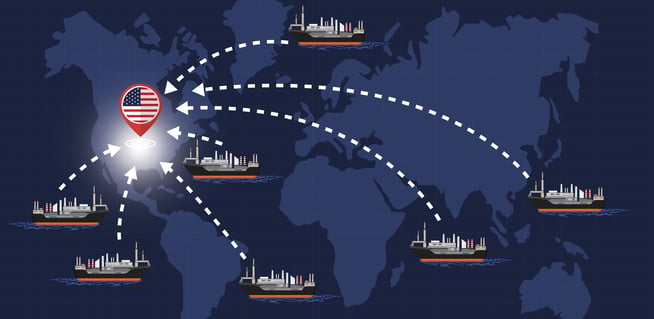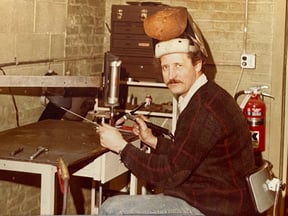
Reshoring, sometimes called onshoring, the process of relocating manufacturing or production operations from offshore sites to a company’s home country, began about a decade ago and accelerated during the COVID-19 pandemic. Post-pandemic, it remains a sound business strategy for six key reasons: 1) Enhanced Quality Control; 2) Supply Chain Resilience; 3) Intellectual Property Protection; 4) Greater Cost Effectiveness; 5) Sustainability and Corporate Responsibility; and 6) Improved Collaboration and Innovation.
To put reshoring in perspective, research conducted recently by the Chartered Institute of Procurement & Supply (CIPS), an international organization of supply chain professionals, reveals that 25% of global trade will relocate within three years due to economic and geopolitical instability. The study also found that, by 2026, the geographic distribution of global suppliers will fundamentally shift from being mostly global to mostly local.
To underscore this trend, a nationwide study of CEOs in 2022 found that 58% are considering reshoring, and that more than 40% estimate the timeframe to have operations fully reshored is one to three years. Similarly, a 2023 study of U.S. manufacturing executives by Forbes, Xometry and Zogby found that “82% of executives polled said they’d either moved overseas factories back home or were in the process of doing so.”
For the past 46 years, during a period when offshoring and low-cost production have been the rule instead of the exception, Advance Welding has been helping companies in the Aerospace, Defense, Energy, Medical, Semiconductor, and Automotive sectors achieve a superior combination of quality and value for the specialty welding and metal fabrication services. By offering singular value, we assist our clients in meeting their own competitive goals and KPIs.
 We have been able to defy convention because our co-founders, Kaz and Carol Kielb, believed in doing things the right way every time. That mindset has been passed down to the next generation of ownership and our entire team. Customers appreciate our attention to detail, and those sentiments are reflected in the longevity of our relationships and the word-of-mouth factor that has allowed us to form additional long-term relationships that have helped many of the companies we work with benefit from:
We have been able to defy convention because our co-founders, Kaz and Carol Kielb, believed in doing things the right way every time. That mindset has been passed down to the next generation of ownership and our entire team. Customers appreciate our attention to detail, and those sentiments are reflected in the longevity of our relationships and the word-of-mouth factor that has allowed us to form additional long-term relationships that have helped many of the companies we work with benefit from:
 Our ability to help clients meet the most demanding specifications and standards is formidable, and many customers have told us it is unmatched. That is because our customers across a half-dozen industries or more require the highest levels of precision and adherence to strict safety standards.
Our ability to help clients meet the most demanding specifications and standards is formidable, and many customers have told us it is unmatched. That is because our customers across a half-dozen industries or more require the highest levels of precision and adherence to strict safety standards.
By using a domestic supplier, customers can maintain tighter control over production processes, which helps to ensure that welds meet or exceed any given specifications or standards.
Proximity to suppliers allows engineers and manufacturing teams to work closely with each other and makes it easier for them to identify and resolve issues in real time, reducing the risk of costly errors or delays.
2. Supply Chain Resilience
 Reshoring can mitigate risks associated with geopolitical tensions, trade disputes, and global supply chain disruptions. Increasing the predictability of when parts and components should be delivered is critical to the timely delivery of finished products.
Reshoring can mitigate risks associated with geopolitical tensions, trade disputes, and global supply chain disruptions. Increasing the predictability of when parts and components should be delivered is critical to the timely delivery of finished products.
That reality is highly prevalent in the aerospace and defense industries, where manufacturers can be penalized financially – sometimes severely -- for late delivery of aircraft, vehicles, weapons systems, and more.
The speed and flexibility that are key characteristics of reshoring are illustrated by the relative ease of adjusting to changing business conditions, and project scope, as well as accelerated R&D cycles and innovation rates.
3. Intellectual Property Protection One thing the Aerospace, Defense, Energy, Medical, Semiconductor, and Automotive sectors have in common is that they invest heavily in R&D.
One thing the Aerospace, Defense, Energy, Medical, Semiconductor, and Automotive sectors have in common is that they invest heavily in R&D.
By reshoring, companies can enjoy stronger legal protections for the intellectual property (IP) that they have developed by investing significant sums of money ranging from millions to hundreds of millions to billions of dollars.
Companies can also better safeguard their IP from theft, thereby increasing their ability to establish and maintain a competitive advantage.
4. Cost Considerations
 Although offshoring may offer lower direct labor costs, the total cost of ownership (TCO), including shipping, inventory, and quality control, may be lower with reshoring.
Although offshoring may offer lower direct labor costs, the total cost of ownership (TCO), including shipping, inventory, and quality control, may be lower with reshoring.
With federal, state, and local governments offering tax incentives, grants, and other means of support for companies that choose to reshore, the cost of transitioning to domestic manufacturing partners can be offset by accessing those funds.
Elected and appointed officials at all levels of government are eager to help companies, but businesses must ask for assistance. To use a biblical phrase, “Seek and ye shall find.”
5. Sustainability and Corporate Responsibility Shorter supply chains mean reduced transportation requirements, contributing to sustainability goals such as having a smaller carbon footprint. This preference, resulting from financial necessity and dovetailing with companies’ core values, is becoming more prevalent across industries.
Shorter supply chains mean reduced transportation requirements, contributing to sustainability goals such as having a smaller carbon footprint. This preference, resulting from financial necessity and dovetailing with companies’ core values, is becoming more prevalent across industries.
In some circles, this philosophy is called the Triple Bottom Line. It is a way for companies to measure success based on profitability, people (e.g., engaging in fair hiring practices, teaming up with not-for-profit organizations that share a company’s values, encouraging volunteerism among team members), and planet. (i.e., minimizing environmental impact)
Reshoring can also contribute to local job creation that aligns with a company’s corporate social responsibility objectives. Many government grants and low-interest loans require the creation of specific numbers of local jobs over defined periods such as three years, five years, or ten years.
6. Collaboration and Innovation
 Reshoring can facilitate collaborations with nearby universities and other research institutions that are difficult or impossible to achieve overseas. That proximity also allows engineering teams to adopt agile and iterative approaches to product design and development.
Reshoring can facilitate collaborations with nearby universities and other research institutions that are difficult or impossible to achieve overseas. That proximity also allows engineering teams to adopt agile and iterative approaches to product design and development.
The close relationships between companies and academic institutions have been a proven way to drive innovation that leads to job creation through access to the latest research, talent, and resources.
In turn, those jobs generate tax revenue that can be used to enhance the quality of life in communities where companies operate.
Conclusion

For companies in a range of market sectors, the benefits of reshoring extend beyond cost savings. Those competitive advantages included improved product quality, more innovation, and higher reliability. Reshoring also allows for more efficient workflows and timely interactions between and among team members responsible for the successful field performance of a part, component, or system, the failure of which could be catastrophic. For 46 years, we have been onshore, and we are more prepared than ever to help companies reshore.
To share your thoughts or experiences related to reshoring… Contact Us


